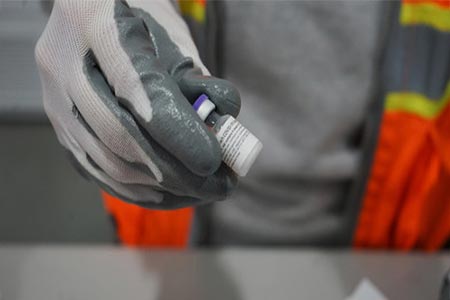Direct Relief is meeting surging demand for refrigerated medications by nearly tripling its pharmaceutical refrigeration capacity.
The humanitarian organization recently completed a second cold room with 5,400 square feet of floor space, with racks rising three stories high and fully redundant refrigeration.
Direct Relief's existing cold storage room, a 2,900-square-foot facility that opened in 2018 at its California headquarters, is already full much of the time. The two rooms combined can hold up to 677 pallets of medicine for treating people with severe illnesses around the globe.
Direct Relief invested $1.5 million to build and equip the new cold room and is now working to increase its existing solar and battery capacity to help offset the room's energy needs.
The value of Direct Relief's cold chain shipments has nearly quadrupled since 2018, from $102 million in the year ended June 30, 2018, to $387 million (wholesale) in the year ended June 30, 2021.
In all, the organization delivered 37.9 million defined daily doses of refrigerated or frozen medicine to 55 countries worldwide during its 2021 fiscal year, including Covid-19 antibody treatments, insulin for children with Type 1 diabetes, and advanced chemotherapy medicine to treat pediatric cancer patients.
Cold chain is an increasingly important part of medical logistics. Global cold chain pharmaceutical production is forecasted to grow 48% between 2018 and 2024, vs. 27% growth in room-temperature pharmaceutical production, according to Pharmaceutical Commerce. In 2019, 45% of new drugs approved by the FDA required refrigeration or freezing.
"Even before Covid and the urgency of the global vaccination effort, the fact that most of the new therapies being developed to treat and cure disease are cold chain products was sobering," said Direct Relief President and CEO Thomas Tighe.
"Limited cold chain distribution capacity already creates a practical barrier to people obtaining access to medications and therapies – even when they are free. Given where research is going, if the shortcomings go unaddressed, the difference between the haves and have-nots will only intensify. People who are poor or who live in poor areas will simply not benefit from the profound scientific advances being made in health."
Cold chain delivery of medicines requires a level of planning that far exceeds what is needed for conventional goods or non-refrigerated pharmaceuticals.
Direct Relief must plan every step along the way – every link in the cold chain – to ensure the medicine remains within the required temperature range from when it leaves its warehouse until it arrives.
Direct Relief uses modeling software to map the optimal shipment route and inform packaging requirements for conditions along the way. The medicine is placed into specially constructed boxes to assist in keeping the required temperature.
The boxes are lined with materials such as vacuum insulated panels to keep the coolants at optimal temperature and protect against ambient temperature exposures and with materials that freeze at temperatures lower or higher than the freezing point of water, allowing precise control.
The boxes also include devices that monitor temperature continuously, transmitting the data via cell towers along transportation routes or via download and transmission at the endpoint. Shipments are usually modeled to protect medicine for up to 120 hours in transit.
"New medications and therapies, whether for Covid-19, diabetes, cancer or other serious illnesses, are only as good as their ability to reach patients," said Damon Taugher, Direct Relief's vice president of global programs.
"A lot of analysis and oversight goes into our work to ensure transportation lanes are vetted and trusted and that we are confident to put these critical medicines into a supply chain to remote parts of the world."
While efforts to vaccinate the world's population against Covid-19 will bring some improved technology and practices, they will hardly establish a reliable global cold chain infrastructure.
"Significant capital investment is needed, not just for refrigerators and freezers, but also for resilient power," Taugher said. "Hurricane Ida was an example of this. If health facilities don't have adequate backup power, it doesn't matter how good your refrigeration is; it all spoils. Power is a prerequisite for health."


